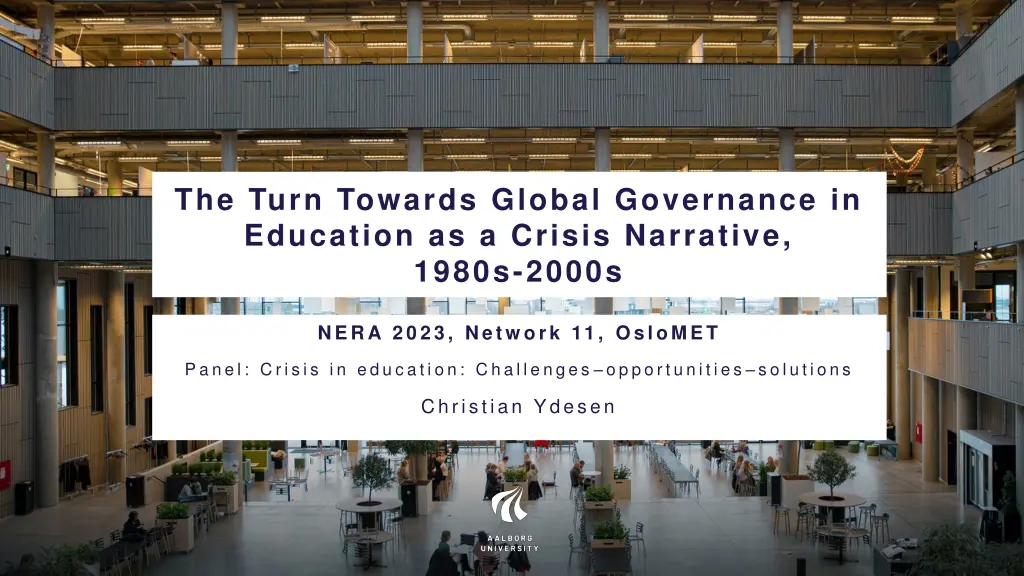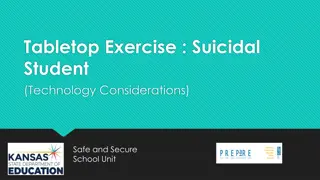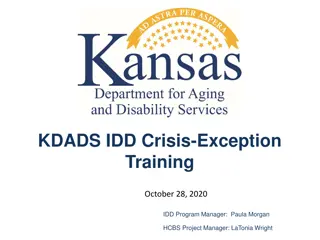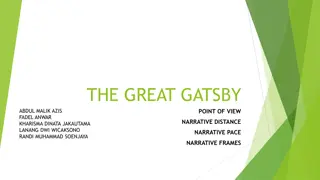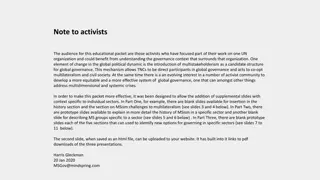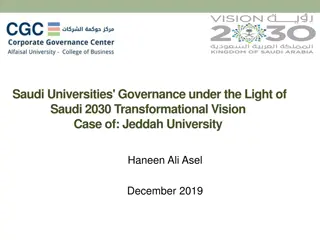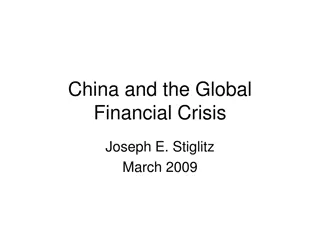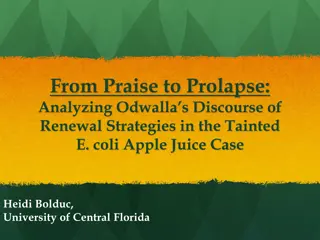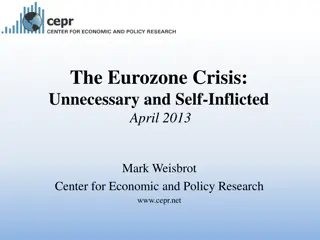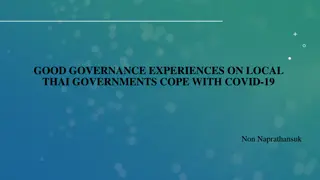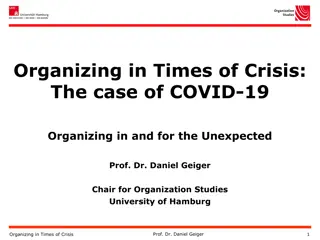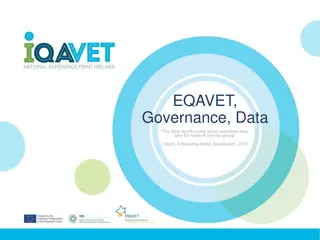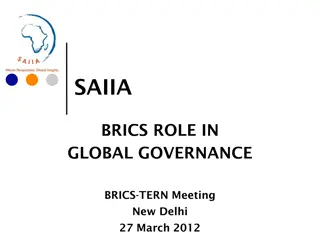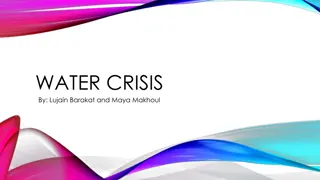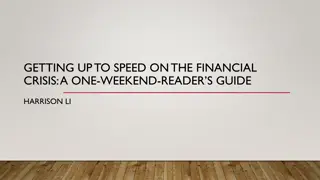Global Governance in Education Crisis Narrative
Explore the shift towards global governance in education, focusing on the impact of global learning metrics. The narrative delves into how initiatives like SDG 4 shape education assessment, highlighting challenges like the narrowing of educational agendas and the devaluing of non-measurable learning. The text critiques the World Bank's metrics-driven approach, foreseeing implications on educational equity and policy-making processes. It delves into the entangled history of UNESCO, OECD, and the World Bank in global education governance, examining their impact on societal goals and policy discourses.
Uploaded on Mar 04, 2024 | 5 Views
Download Presentation

Please find below an Image/Link to download the presentation.
The content on the website is provided AS IS for your information and personal use only. It may not be sold, licensed, or shared on other websites without obtaining consent from the author. Download presentation by click this link. If you encounter any issues during the download, it is possible that the publisher has removed the file from their server.
E N D
Presentation Transcript
The Turn Towards Global Governance in Education as a Crisis Narrative, 1980s-2000s NERA 2023, Network 11, OsloMET Panel: Crisis in education: Challenges opportunities solutions Christian Ydesen
The contemporary situation two observations Drawing on the growing rhetoric of a global learning crisis and informed by innovative yet problematic technical work, we argue that the powerful movement to construct GLMs [global learning metrics] has outcomes. These include the effective narrowing of the comprehensive global agenda on education (SDG 4), the undermining of a carefully negotiated country-led process to promote lifelong education opportunities for all, the devaluing of learning that is not measurable or comparable, and the weakening of the principle of educational equity. In the context of SDG 4, we are seeing assessment for all as a central vision, which is tied to the production of global metrics, forming a transnational metrological field (Grek, 2020, p. 161), and the construction of numbers as the new doxa of transnational governance that legitimates a whole series of informal and ad hoc arrangements, all accepted and all approved in the name of an education crisis (p. 161). Stuck in the dogma of results-based management, the World Bank is likely to continue down the path of the measurement and assessment agenda, a frenetic metrics machine (Mundy, 2019, para. 6), promoting ever more targets and benchmarks, such as the Learning Poverty target, involving a Learning Assessment Platform, aligned with initiatives such as the Human Capital Project (World Bank, 2019). several unintended Benavot & Smith (2019), p. 239 P A G E 2
The book behind the presentation Elfert, M., & Ydesen, C. (2023). Global governance of education: The historical and contemporary entanglements of UNESCO, the OECD and the World Bank. Educational Governance Research Series (Series Eds. S. Carney & L. Moos). Dordrecht: Springer. UNESCO, OECD and the World Bank have built legitimacy on promising the achievement of a range of societal goals, such as economic growth and productivity, the reduction of poverty and inequality, education for all and 21st century skills . Although it could be argued that they largely failed to deliver on these promises, they have been successful in normalizing and globalizing educational discourses and policy agendas Draws on primary source materials harvested from the U.S. National Archives, the Rockefeller Archive Center and the UNESCO, OECD and World Bank archives, as well as 35 interviews. P A G E 3
Structure of the presention Outset and overall historical argument The crisis behind international comparative Indicators in the 1980s The crisis surrounding education statistics and the emergence of PISA in the 1990s The crisis in evidence-based policy research in the 2000s Concluding remarks P A G E 4
Outset and overall historical argument Many US-spearheaded conferences on international education were held in the 1960s: The Bellagio meetings in 1960 called on governments to adopt a human capital approach and expand their educational systems to boost growth The 1961 OECD Policy Conference on Economic Growth and Investment in Education held in Washington D.C. The International Conference on the World Crisis in Education at Williamsburg, Virginia, in 1967 These conferences formed the breeding ground of the contemporary global governing complex in education (systems analysis comparative indicators and competences PISA) The US government, the newly created IOs, and the big American philanthropic foundations and universities formed a network of global governance that promoted an economistic approach to education as a Cold War weapon of American dominance. Educationalization of social problems P A G E 5
The crisis behind Int. Comparative Indicators in the 1980s 6 The US performed poorly in the Second International Mathematics Study (SIMS) conducted by the IEA between 1980 and 1982. These results angered the US government which found that sampling made by the IEA had not been cleared by any government agency. This situation prompted the government s call for precise definitions, systematic methodology, and standardized procedures around international comparative performance indicators in education Then came the A Nation at Risk report in 1983 which essentially portrayed the American education system as a hazard in the geopolitical race with Japan and the Soviet bloc. The report prompted the United States to push for the development of international comparative indicators the OECD created the International Educational Indicators (INES) project in the late 1980s
Extrapolated nationalism By the mid 80s, the US changed its role in the educational collaboration of the OECD from passivity to aggressive missionary activities, characterized by "fight against communism" and religious fundamentalism. In the eyes of the new US delegates, Western Europe mainly consisted of semi-communist countries, and the Nordic countries were definitely behind the iron curtain. Tr hler (2020) has argued that PISA has a national background, namely the United States, which educationalized the Cold War, implemented school reforms and developed a test system that was intended to ensure the effects of these reforms. It was this national model that was globally extrapolated via the OECD, and now pretends to be global instead of imperial (p. 21-22). NB: Centeno (2017) argues it was precisely the economic turbulence of the 1970s caused by the oil crises that prompted the OECD to shape its identity as the producer of league tables, benchmarking, and statistics that interlinked social, economic, and political issues (pp. 110 111). Picture: Kjell Eide (1925-2011). Eide headed the OECD s work on education planning and he served as the first board chairman of CERI. P A G E 7
The Crisis surrounding Education Statistics A host of actors at the global level increasingly found UNESCO statistics to be of insufficient quality and the OECD and IEA were being positioned to take leading roles in developing comparative statistics on education. The crisis led to the reconfiguration of the UNESCO Divisions of Statistics in 1999, which was transferred from UNESCO headquarters in Paris to Montreal in 2001 and restructured as the UNESCO Institute for Statistics (UIS). Background: The United States followed by the United Kingdom and Singapore had withdrawn its UNESCO membership in 1984. The reviews of UNESCO statistics were largely produced by American organizations (e.g. Board on International Comparative Studies in Education (BICSE) 1988) while the United States strongly backed and supported the INES project in the OECD. The UIS went to Canada to win the Americans and British back and compensate for Canada not getting a UN regional office. This was also a way of appeasing the World Bank that had threatened to build its own division of statistics, and the World Bank ended up supporting and funding the UIS, which was not too far from Washington and in the same time zone. P A G E 8
The emergence of PISA key developments The general wave of educational reforms that has been apparent in most of the OECD Member countries since the 1980s and which is characterized by an overriding concern with the effectiveness of schools seems to have brought with it a new interest in comparability issues. International comparisons of educational conditions and performance are now perceived as a means of adding depth and perspective to the analysis of national situations. References to other nations policies and results are beginning to be routinely used in discussions of education, and comparability now belongs with accountability to that changing set of driving words which shape the current management paradigm of education. (p. 17) Tom Alexander, Director of the OECD Directorate for Education, Employment, Labour, and Social Affairs (DEELSA), 1991 EAG (1992) - a milestone in the development of education data, indicators and statistics In 1995, UNESCO, the OECD, and Eurostat joined forces in collecting data on key aspects of education, thus consolidating a liaison formed when the OECD adapted the International Standard Classification of Education (ISCED) Systems. According to Ron Gass, Director of CERI, Tom Alexander, pulled off a major coup because he succeeded in absorbing IEA methodology into the INES programme, allegedly because the IEA fell into difficulties financially Swedish Professor Jarl Bengtsson s recruitment of Schleicher for the OECD in 1994 a new regime of expertise - a tremendous boost to the OECD s reach in education P A G E 9
Crisis in Evidence-Based Policy Research in the 2000s Profound disagreements over the nature of evidence-based policy research (EBPR) existed in CERI. Between 2004 and 2006, four OECD conferences on EBPR in education were held. The first conference entitled OECD U.S. Meeting on Evidence-Based Policy Research held in Washington D.C. in 2004 was characterized by a clash of agendas between the United States and the bloc of Scandinavian countries in terms of how to understand EBPR. Mats Ekholm, former Director-General in the Swedish Ministry of Education, I remember well that there was a stormy meeting in Washington where we Europeans pointed out that the Americans were almost crazy because they strongly claimed evidence-basing as the only true religion in the educational field Nor were the Americans interested in the learning that takes place in schools outside the school subjects, such as the development of independence, solidarity, tolerance. Ekholm criticised the conference's one-sided focus on RCTs. He found that there was a certain dogmatism where everyone must be strong believers in RCTs, which, he contended, are only one way to gather systematic knowledge. P A G E 1 0
The Nordic Front at the 2004 EPBR conference J rn Skovsgaard from the Danish Ministry of Education approved of Ekholm's speech, agreeing that there is a need to develop the toolbox with a plurality of evidence types. Ole-Jakob Skodvin, a representative of the Norwegian Ministry stressed that he also believed that a more holistic approach is needed and that there is a need to take into account that contexts and approaches vary between countries Skovsgaard explains that, The Americans were very frustrated with some of us because we did not buy into their agenda and we were very critical of their bombastic behaviour. They came up with a somewhat violent rhetoric, such as that their proposal based on 'randomised controlled trials' was 'a gold standard' and they talked about a 'coalition of the willing . The issue at stake is what kinds of knowledge and experiences deriving from national contexts should be recognised in the OECD arena. In subsequent years, the American approach prevailed. P A G E 1 1
12 Concluding remarks Education is a reflection of wider agendas and contexts a host of distinct national, global and geopolitical agendas contain motifs for concrete change and innovation A tension between education as a field and a practice versus education as a vehicle for achieving political goals May I say that, in this context, the fight for education is too important to be left solely to the educators - Walter W. Heller, chair of the Council of Economic Advisers, a key speaker at the 1961 OECD conference Education is seen as the fixer of crises and social problems (educationalization and social engineering) versus education as a conservative and conservating practice Inter- and intraorganizational tensions and turf wars but also pragmatic collaboration between stakeholders and actors P A G E 1 2
13 References Addey, C. (2018). The assessment culture of international organizations: From philosophical doubt to statistical certainty through the appearance and growth of International Large-scale Assessments. In M. Lawn, & C. Alarcon (Eds), Student assessment cultures in historical perspective (pp. 379-408). Peter Lang. Benavot, A., & Smith, W. (2019). Reshaping quality and equity: Global learning metrics as a ready-made solution to a manufactured crisis. In A. Wulff (Ed.), Grading goal 4. Tensions, threats, and opportunities in the Sustainable Development Goal on quality education (pp. 238-261). Brill Sense Centeno, V. G. (2017). The OECD s educational agendas: Framed from above, fed from below, determined in an interaction: A Study on the recurrent education agenda. Peter Lang. Champion Ward, F. (Ed.). (1974). Education and development reconsidered. The Bellagio conference papers. Praeger Publishers and Ford Foundation. Eide, K. (1990), 30 years of educational collaboration in the OECD. International Congress Planning and Management of Educational Development , Mexico, 26 30 March 1990. Available at http://unesdoc.unesco.org/images/0008/000857/085725eo.pdf Grek, S. (2020). Prophets, saviours and saints: Symbolic governance and the rise of a transnational metrological field. International Review of Education, 66(2-3), 139-166. Jessop, B. (2003). Globalization: It s about time too! Political Science Series, 85. Vienna: Institute for Advanced Studies Mundy, K. (2019, October 20). The new learning targets redux. Karen Mundy s blog: Global governance and educational change. Tr hler, D. (2020). Nation-state, education and the fabrication of national-minded citizens (introduction). Croatian Journal of Education, 2, 11-27. World Bank (2019). Ending learning poverty: What will it take? https://openknowledge.worldbank.org/handle/10986/32553 P A G E 1 3
